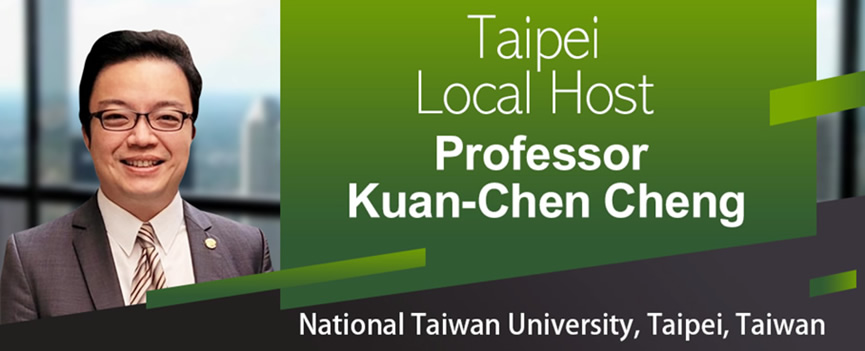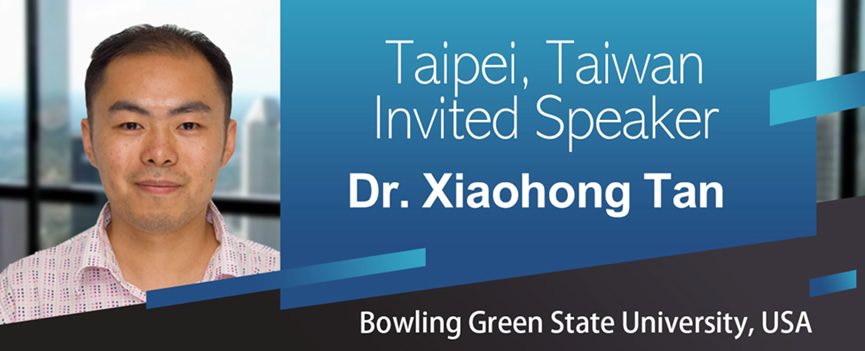The 6th International Congress on Natural Sciences and Engineering
May18-20, 2025Taipei, Taiwan

Introduction:
Dr. Kuan-Chen Cheng joined the Institute of Food Science and Technology, National Taiwan University, as a faculty member in 2011, after having obtained his PhD in Microbial Engineering at the Pennsylvania State University in 2010, followed by one year of postdoctoral training at the University of Arizona at Tucson. Dr. Cheng became a full professor in 2019 and honored an IAFoST fellow in 2024. Dr. Cheng has mentored 7 post-doc fellows, 11 PhD students, and 90+ master students already. The R&D work of his group focuses on three major areas: food biotechnology, renewable biomaterials and precision health. Major areas in which he has been actively involved in recent years include (1) the establishment of food fermentation processes that have assisted the local food industry in producing value-added functional foods; (2) the introduction of novel techniques for the food industry, including cold plasma technology, electrospinning, and microbiome cultivation; and (3) the development of fermented functional foods for aged people. His work has been recognized at an international level as reflected by his publication record of over 160+ SCI-listed journal articles (7,029 citations and h-index of 44) in food-related fields.
Welcome to TaipeiOn behalf of the organizing committee, it is our great pleasure to invite you to the joint conference of ICNSE, ISEPST, BREFM, and SICASE, which will take place at the Sheraton Grand Taipei Hotel in Taipei, Taiwan, from May 18 to 20, 2025.
In the post-pandemic era, we are delighted that these four conferences—ICNSE, ISEPST, BREFM, and SICASE—can once again be held as in-person events. The active participation of attendees not only enhances the impact of the meetings but also fosters international collaborations and connections. Continuing this valued tradition, we are confident that this joint conference will serve as an excellent platform for exchanging ideas, sharing research, and deepening our understanding of current issues across multiple disciplines.
We extend our heartfelt gratitude to the organizing committee members, conference sponsors, and dedicated staffs who have contributed their time and efforts to make this event possible. A special thanks also goes to our keynote and invited speakers, as well as to all participants who will be presenting their work and insights through talks and poster sessions.
Taipei is a dynamic city that seamlessly blends technology, culture, education, and tourism. As a global tech hub, it is home to world-class innovation, including the renowned Taipei 101 and the thriving semiconductor industry. Rich in history and culture, Taipei offers stunning temples, night markets, and museums like the National Palace Museum. The city’s top universities foster academic excellence and research. Visitors can explore scenic spots like Yangmingshan National Park or relax in Beitou’s hot springs. With its vibrant mix of modernity and tradition, Taipei is a must-visit destination for business, learning, and adventure.
We sincerely hope you enjoy both the conference and your time in the vibrant city of Taipei. Looking forward to welcoming you soon!
Thank you!

Biography:Dr. Xiaohong Tan earned his Bachelor’s and Master’s degrees from Sichuan University, China, and his Ph.D. from Nanyang Technological University, Singapore. Following his postdoctoral training at the Center for Nucleic Acids Science and Technology at Carnegie Mellon University, USA, he began his independent research career in the Chemistry Department at Bowling Green State University, USA. His expertise spans nucleic acid chemistry, peptide chemistry, and protein biochemistry, with a particular focus on designing aptamer- and peptide-based probes for precise protein recognition, enabling the study of protein-protein and protein-nucleic acid interactions. Dr. Tan serves as an Associate Editor for Frontiers in Molecular Biosciences: Molecular Recognition and is also a member of the Editorial Board for Scientific Reports. His recent research has been published in high-impact journals, including Journal of the American Chemical Society, Nature Communications, Theranostics, Organic Letters, Analytical Chemistry, and Chemical Communications etc.
Dual-Handed Recognition: Targeting a Single Protein with Two Chemical Ligands
Studying protein-protein interactions (PPIs) is crucial to understanding cellular processes, as proteins are the primary functional molecules within cells. Peptides and aptamers, which bridge the gap between antibodies and small molecules in terms of size and physical properties, play key roles in studying PPIs. Peptides are ideal ligands for recognizing proteins through hydrogen bonds, van der Waals forces, and ionic interactions. They can be chemically synthesized at low cost, have relatively low molecular weights, and exhibit enhanced tissue and cellular penetration. Aptamers, short single-stranded RNA or DNA molecules, can form unique spatial structures that enable them to tightly and specifically bind to a variety of targets. As an attractive alternative to antibodies, aptamers, particularly DNA-based ones, offer several advantages, such as long shelf life, low toxicity, low immunogenicity, cost-effective chemical synthesis, and the ability to tolerate diverse chemical modifications. In this talk, I will introduce bivalent protein-binding ligands, which consist of aptamers and/or peptides. These ligands are composed of two subunits, each capable of interacting with separate binding sites on a single protein, providing a new strategy for modulating PPIs and enhancing affinity, specificity and efficacy in target recognition.
Venue:


